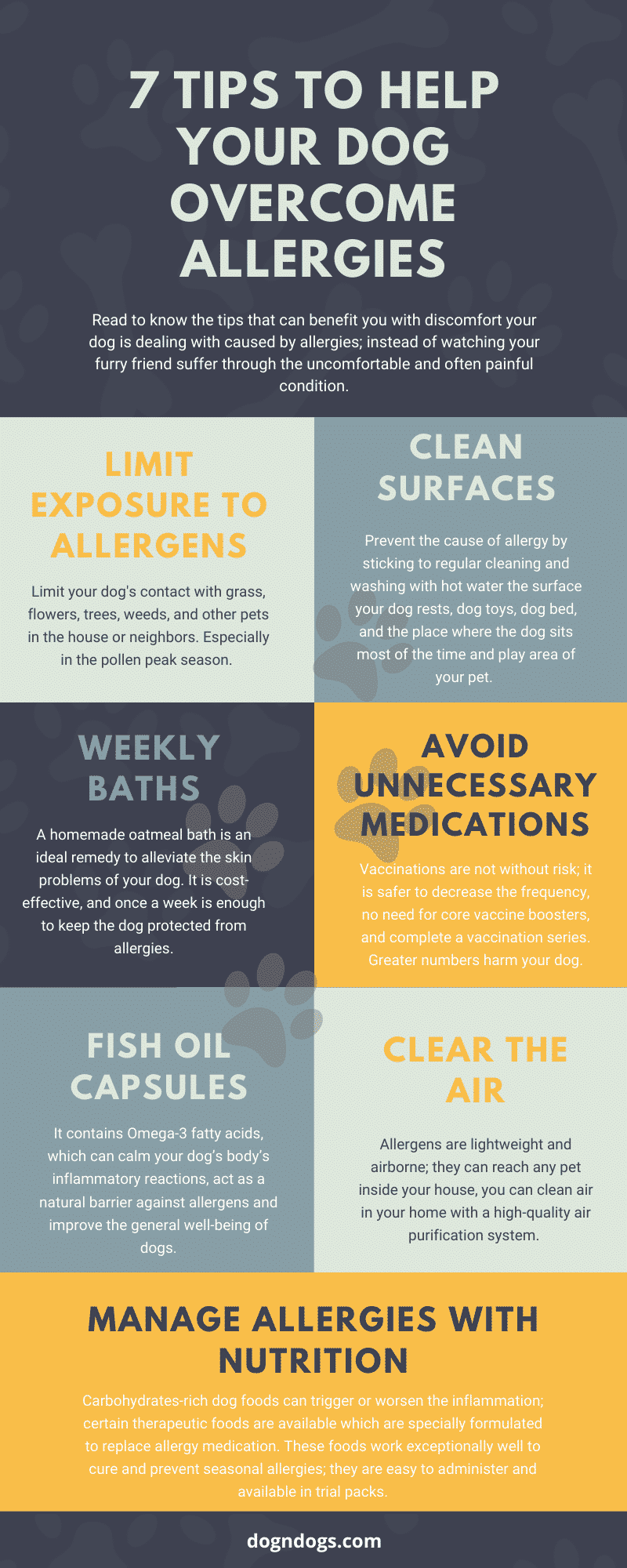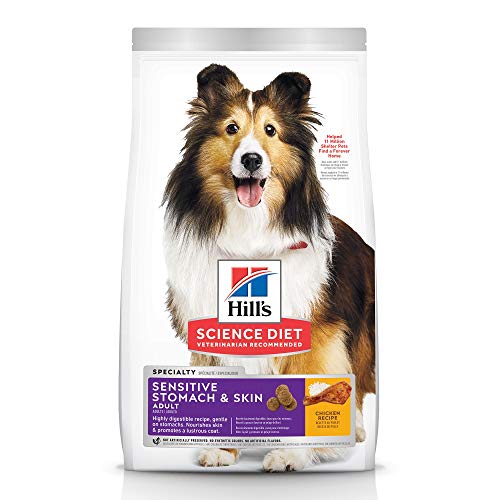Skin allergies in your pooch don’t just come from bad hygiene but also due to the wrong food. While some dogs won’t show any signs of allergies from their regular food but some might show mild to life-threatening allergic symptoms that need the immediate attention of your vet.
There are several items in your dog’s daily meal that might cause allergies, and it is important to identify what it is to ensure that your pooch is safe. More than anything, the allergy that ails your pooch the most is skin allergy. Although there are several ways to provide some relief to your dog that includes allergy medications, special shampoo bath, and so on, the ultimate key is to avoid the food items that cause allergies.

However, picking hypoallergenic food for your dog might not be as easy as shopping for groceries. You must have to work in sync with your local veterinarian in order to locate an appropriate food that is best for your pooch’s skin or any other allergies.
Before we go ahead and suggest the best food options in the market for allergies, let us peek into the symptoms that might surface in case your dog is suffering from allergies.
Before Moving forward let’s have a look on our top recommendations:
| Image | Brand | Price | Prime | Buy |
|---|---|---|---|---|
Top Top Top | DIAMOND NATURALS | Prime | Buy Now | |
 Top Top | Hill's Science Diet | PrimeEligible | Buy Now | |
 Top Top | Purina Pro Plan | PrimeEligible | Buy Now |
Dog Allergy Symptoms: How do they look like?
The prime and most evident symptom of allergies in any dog is an intense itching sensation in the skin. This is due to the fact that the skin consists of a bigger collection of mast cells that tend to release a higher amount of histamines as a response to the allergies that have caused itching.
When the itching isn’t controlled for a long time, it can cause hot spots in the skin that are burning red in color and eventually cause irritated lesions atop the dog’s skin that is further aggravated by your pooch’s consistent scratching and chewing.
With time, when ignored, these areas tend to become infected and cause major issues for the dog.
Apart from this scratching and lesions, dog skin allergies can also cause problematic issues such as:
- Alopecia or Hair Loss
- Crusty and Dry Skin
- Poor Quality Coat
- Self-Mutilation due to Constant Scratching and Chewing
- Skin Thickening
- Ear Infections
- Diarrhea
If you happen to observe these symptoms in the dog, the immediate call is to get in touch with your veterinary service provider and get a solution for the same. Also, notice your pup’s regular behavior very minutely. Although the symptoms of allergies might not be visible outright, you can pick up the problem before it worsens by observing the symptoms.
Given the fact that your pooch is covered all around in thick fur, it might be difficult to immediately observe any redness in the skin or any possible irritation. So, the best way to go about it is to observe them on a regular basis and report any change to the vet immediately.
When addressing your canine’s health, it is better to find a solution before the condition worsens. If your pooch seems more irritated and uncomfortable than he/she normally is, you should try and look through the hair to find out if there are any signs of redness.
In case of allergies, your dog would chew, lick, or scratch themselves like crazy.
Now that you know how to look for symptoms that might confirm the presence of allergens in his/her body let us take a look at the common causes of allergies in your dog.
It becomes challenging to select an allergy-treating food for your old dogs; in such case, the first preference should be Dry Dog Food with Soft Pieces or a vet dog food that your older dog can eat and digest easily. Thank God our recommendations are also easy to chew and digest for older dogs.
Dog Allergies: Common Allergens to Know About

We have learned about the symptoms of dog allergies, but what exactly causes these allergies in your pooch? There are several possibilities & allergens that might affect your canine partner’s immune system.
At times, these are the very same substances known to cause allergies in humans as well. Your dog’s allergies can be categorized into these types:
1. Contact Allergies
Inhalant and contact allergies are mostly caused due to substances that your dog might have come in contact within the environment or probably inhaled. These allergies are things such as pollens from trees, weeds, grasses, dirt, mold, or even dust mites.
However, it might not always be easy to identify the cause of allergy. This is because the generic symptoms are all one and the same for most allergens.
The key is to ask your veterinarian to detect the patient’s history and nail down the ingredients one by one to detect the causal agent. In case you notice that your dog’s allergies surface on a seasonal basis while worsening during the summer or spring months, it could be caused by the pollens.
However, if these allergies happen all year long, they could be caused due to dust or mold. To correct this situation, you need to connect with your veterinarian as soon as possible. The key is to limit the pooch’s exposure to such allergens that you think could be causing this issue.
2. Food Allergies
A big chunk of skin allergies being faced by your dog is generally caused by the ingredients found within the dog’s diet. Now, this allergy generally stems from the protein present in your pooch’s food. Almost all of the food allergies & sensitivities that ail your dog are caused due to protein.
The common protein items are known to cause food allergies or intolerance are:
- Wheat
- Dairy
- Beef
- Soy
- Eggs
- Chicken
- Corn
- Pork
- Rabbit
- Fish
- Lamb
As you can see, a lot of these allergies stem from animal proteins. However, there are multiple non-protein-based allergens that might also affect your pooch. Things such as soy, corn, or wheat can cause substantial allergies in your dog.
A rigorous treatment for your pooch would involve the use of an elimination diet. This means you need to provide your dog a novel source of protein that he/she might not have eaten anytime before this. Options such as salmon or duck can aid in the same while you gradually add the common protein variants.
In case your pup shows allergies to the latest protein sources, you can easily confirm what has been causing the problem. Stick to one protein source at a time and check whether your dog has an allergic reaction to the same. This selective feeding can help in the gradual identification and elimination of issues that ail your fur baby.
3. Flea Allergies
Have you seen those pesky little bugs jumping around in your pooch’s skin? These black-colored bugs are known as fleas and could cause severe allergies for your dog. Fleas, by themselves, might not cause allergies in your dog, but the proteins found in their saliva do. Few bites from these fleas can induce allergic reactions.
The symptoms of flea bites include scratching, intense itching, hair loss, or similar allergic reactions. Flea allergies can be easily treated using corticosteroids, dietary adjustments, flea medications, as well as a collection of them all. In case this scratching induced due to flea allergies leads to secondary infection on the pooch’s skin, using an antibiotic could help a lot.
Below table will help to identify the type of allergy easily:
[ninja_tables id=”14727″]
How to Select the Best Dog Food for Allergies?
Now that you know the types of allergens and the symptoms that you might see on your pooch let us focus on the way to select the right dog food for allergies. More than 10% of all skin-associated allergies in the dog are caused due to food. This means that the pets need to change their diet in order to feel a bit better.
In your search for the right dog food to avoid skin allergies, you will come across a plethora of choices. To make the perfect selection, you need to understand the terms in the packaging as well. Here are some common terms to understand before buying hypoallergenic dog food.
1-Limited-Ingredient Meal:
With few selective ingredients present in your pooch’s food, you can ensure that there are zero allergic reactions that stem from it. Food with limited-ingredient packaging generally has a single source of protein & might also have just one source of carbohydrate such as brown rice.
For most pet owners, limited-ingredient food is the best way to eliminate or reduce the pooch’s allergic reactions.
2-Grain-Free Meal:
If yours is a dog with sensitivity to grains such as corn, wheat, rye, or any other options, investing in grain-free food is the right way to go. In case you are doubtful, your vet can provide you help in picking the right grain-free diet to adhere to your dog’s nutritional needs and life stage.
However, keep in mind that in the past FDA had issued a major warning that linked grain-free dog food to different types of heart diseases. So, make sure you get approval from the veterinarian before you purchase any grain-free food for your pooch.
3-Novel Protein Diet:
This particular type of food packs uncommon protein sources that might not generally be available for your dog. The options could include salmon, duck, or even venison. Keep in mind that your limited-ingredient protein diet might also pack in the novel protein.
This is why a novel protein diet can also be termed a limited-ingredient diet.
4-Prescription Diet:
In case none of the above options work for your dog, you could ask your veterinarian to formulate a prescription diet. This approach might be important for any dog that suffers from severe allergic issues.
Further, it is crucial that you pay attention to all the ingredients present in your pooch’s food. You could see certain terms such as turkey meal, chicken meal, meat meal, fish meal, lamb meal, and many more.
For example, a meat meal suggests that the food consists of bone and meat cooked, sifted, and ground for creating this ingredient. This means it isn’t pure meat & the act of processing the same could cause the induction of additional allergens. So, make sure you find pet food with a pure source of meat instead of the by-product in the meal.
Before moving forward to review the best dog foods for allergies it is imperative to know that different foods cater to different needs. Like Soft Dog Food for Older Dogs with Bad Teeth are formulated for older dogs who cannot chew hard kibble, and non prescription low phosphorus dog food to address medical reasons which need doctors prescription. On the other hand, Dog Food to Prevent Struvite Crystals and dog food for less poop are also available to make petting easy and keep the dogs healthy.
Other Methods to Help Improve the Allergic Symptoms in your Pup

When you quickly glance through Amazon, you would notice a lot of options to select from for your pooch’s allergic issues. However, the hard part is selecting the one that is right for you. To do this, the right way is to closely work with the vet in order to help your dog be comfortable.
Apart from selecting the right food products, you can also opt for dietary supplements added to your dog food, such as omega-3 and omega-6 fatty acids, along with prebiotics or probiotics. This helps keep your dog’s skin healthy, shiny, and smooth.
You can also make use of medicated sprays and shampoos that help your dog get some relief from the itching issues. Your vet can also prescribe allergy medications for the dog to help manage the symptoms.
Sometimes sensitive stomachs also become a cause of allergies, if this is the case then a best canned dog food for sensitive stomachs can be an authentic solution to address the problem from its roots.
Which dog breed is more prone to food allergies?
By now, we have understood all that is needed to help your pooch get quick relief from allergies; let us understand whether your pooch is pre-disposed to food allergies or not. Here are some breeds that are prone to get affected by allergies faster than other breeds.
- Dachshund
- Beagle
- Bichon Frise
- Pug
- Dalmatian
- Boxer
- Retrievers
- German Shepherd
- Bulldog
- Shar Pei
- Setters
- Lhasa Apso
- Maltese
- Chinese Crested
- Shih Tzu
- Terriers
- Cocker Spaniel
- Pekinese
- Poodle
- Collie
When Should You Contact Your Vet?
If your dog is prone to an allergic reaction, it is important to be in constant touch with your vet and monitor the situation on a timely basis. Allergic reactions usually start small, and that is the right time to visit your vet. Do not delay allergies as they worsen very fast and can even affect your dog’s health in the long run.
A skin test can help confirm whether the allergic reaction is caused due to food, bugs, or bacteria. Identifying the allergen is important, and we cannot stress this enough!
Now that we are updated with the basics of pet food allergies let us focus on some of the best pet food for dog allergies.
3 Best Dog Food for Allergies
1 – Diamond Skin & Coat Real Meat Recipe
A top-ranked choice for pet lovers is the Diamond Naturals Skin & Coat Dry food. This potato and salmon recipe is the perfect superfood for your pooch that suffers from allergic reactions due to generic protein found in their regular diet.
Given that this is dry food, it can easily last for long without worrying about it going bad, as is the case with wet food options. This hypoallergenic food choice pack in top-notch protein extracted from the wild salmon fish & zero grains.
Certain grain variants are known to cause allergies in a dog which is why the brand focuses on food options that are devoid of grains. This pet food is designed for different life stages of a dog that is based on high-quality amino acids to ensure strong and lean muscles for your pooch.
Flourishing with premium ingredients that include minerals and vitamins, this dry food is essential for a pooch with allergic issues. The food also packs in antioxidants & fatty acids to help the dog’s coat and skin remains healthy.
In terms of digestion, the Diamond Naturals food is highly digestible with an optimum amount of nutrition containing proprietary ingredients and specific gut bacteria species that are known to thrive & survive in your dog’s GI tract aiding the digestive power.
Best of all, the brand isn’t a massive corporate, rather a brand maintained and owned by a family that is based in the US. The manufacturers have kept in mind the selection of ingredients that comes from sustainable and trusted sources on a global scale.
Pros
- Manufactured with the implementation of stringent safety protocols
- Doesn’t contain fillers, wheat, or corn
- Features a proprietary technology for probiotic nourishment
Cons
- The smell might not be appealing to some dogs
2-Purina Pro Plan Sensitive Skin and Stomach Dog Food
Keeping the needs of sensitive skin dogs in mind, the Purina Pro Plan serves as an amazing dietary option for regular use. Not just skin, the food can help aid digestion and relieve any stomach issues that might have been ailing your dog for a long time.
Not just that, this 30-pound pack has rice and salmon as the prime ingredient to help evade any allergies that surface from regular protein sources. The probiotics added to the dry food help maintain a healthy level of gut bacteria that aid digestion and evade any digestive issues.
Further, the Purina Pro Plan consists of an oat meal that is known to reduce any type of inflammation in the body, including that of your stomach. This ingredient is fairly easy to digest for dogs that suffer from indigestion or similar issues such as diarrhea, gastritis, or constipation.
The dry food consists of a protein-packed formula that has real salmon caught fresh from river bodies in the United States. Not just that, the dog meal is fortified with top-notch live probiotics that aid your dog’s immune health. The Purina Dog Food doesn’t consist of any type of artificial colors, flavors, corn, wheat, poultry, or soy in the ingredient list.
Pros
- Contains sunflower oil with Omega-6 fatty acids
- Helps ensure a healthy coat and skin
- Consists of natural fiber with prebiotics
Cons
- Customers might get confused with the formula and packaging change
Is Purina Pro Plan a Good Dog Food? It’s a brand review that we recently concluded with all the pros and cons you need to know before selecting dog food; hopefully, it will help you know more about Purina Pro Plan.
3 – Hill’s Science Diet Dry Dog Food
If you plan to stick to the regular protein components, you might want to go with Hill’s Science Dry Dog Food. Available in 4 different package sizes, including 4LB, 24LB, 30LB, and 15.5LB, this dog food has chicken as its prime source of protein. Meant for adult dogs, this dog food can help pooches with skin and stomach issues.
Skin issues start mostly with the upper surface getting dry, and this could lead to further irritation and inflammation. With Hill’s Science dog food, you can nourish and hydrate your skin in the best way. After a few weeks of your pooch on this dry dog food, you will notice a healthy skin and shiny coat on your dog with irritation subsided.
This dog food is an amazing source of fiber with prebiotic nourishment that helps support the dog’s gut microbiome. In terms of digestion, this dog food is easy to digest and consists of ingredients that keep your dog full for long. With Hill’s Dog Food, you get a nutrition source that is easy to absorb by your dog’s intestine.
If your pooch has been dealing with digestive issues and especially loose stool, this dry food can help ensure better stool consistency and healthier digestion. The dog food also consists of vitamin E and Omega-6 to help your pooch achieve a healthy and lustrous coat and skin.
Manufactured and processed in the United States, this dog food consists of ingredients that dog food dieticians and veterinarians globally recommend.
Pros
- No artificial add-ons, synthetic colors, or preservatives
- It doesn’t contain any by-product meals
- It helps maintain a healthy immune system
- It consists of beet pulp for stomach and gut nourishment
Cons
- Might lead to more water consumption by dogs (Do not panic, its normal)

FAQ’s (Frequently Asked Questions)
Conclusion
A healthy, happy, and playful dog is something we all love to watch, and in no way would we want them to be troubled by skin or stomach issues. With the best hypoallergenic dog food and quick intervention by the veterinarian, you can help your pooch stay healthy for years to come.
Remember, food allergies might develop even at later stages of your dog’s life. Something that hasn’t caused allergies for him/her to date doesn’t mean that it won’t trouble them later in life. So, keep tracking any change in behavior or notice any recurrent itching issues that might have started irritating your pooch of late.



